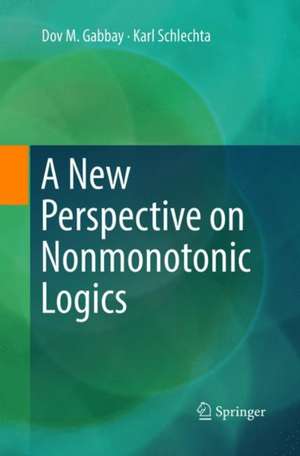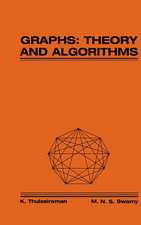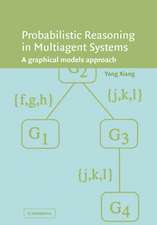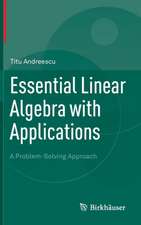A New Perspective on Nonmonotonic Logics
Autor Dov M. Gabbay, Karl Schlechtaen Limba Engleză Paperback – 29 iun 2018
It is suitable for researchers in the area of computer science and mathematical logic.
| Toate formatele și edițiile | Preț | Express |
|---|---|---|
| Paperback (1) | 636.28 lei 43-57 zile | |
| Springer International Publishing – 29 iun 2018 | 636.28 lei 43-57 zile | |
| Hardback (1) | 642.59 lei 43-57 zile | |
| Springer International Publishing – 14 noi 2016 | 642.59 lei 43-57 zile |
Preț: 636.28 lei
Preț vechi: 795.35 lei
-20% Nou
Puncte Express: 954
Preț estimativ în valută:
121.77€ • 126.49$ • 101.15£
121.77€ • 126.49$ • 101.15£
Carte tipărită la comandă
Livrare economică 03-17 februarie 25
Preluare comenzi: 021 569.72.76
Specificații
ISBN-13: 9783319835938
ISBN-10: 3319835939
Ilustrații: X, 365 p. 80 illus.
Dimensiuni: 155 x 235 mm
Greutate: 0.53 kg
Ediția:Softcover reprint of the original 1st ed. 2016
Editura: Springer International Publishing
Colecția Springer
Locul publicării:Cham, Switzerland
ISBN-10: 3319835939
Ilustrații: X, 365 p. 80 illus.
Dimensiuni: 155 x 235 mm
Greutate: 0.53 kg
Ediția:Softcover reprint of the original 1st ed. 2016
Editura: Springer International Publishing
Colecția Springer
Locul publicării:Cham, Switzerland
Cuprins
Part I - Introduction.- Part II - Background Material.- Basic Algebraic and Logical Definitions.- Defeasible Inheritance.- Reiter Defaults and Autoepistemic Logic.- Preferential Structures and Related Concepts.- Deontic Logic, Contrary-to-Duty Obligations.- Theory Revision, Theory Contraction, and Conditionals.- Neurology.- Part III - New Results.- Independence and Interpolation.- Probabilistic and Abstract Independence.- Formal Construction.- The Talmudic Kal Vachomer Rule.- Equational CTD.- Conclusion.- Index.
Notă biografică
Dov Gabbay is the (Emeritus) Augustus de Morgan Professor of Logic at King’s College London, an invited professor at the Université de Luxembourg, a professor at Bar-Ilan University, Israel, and a professor of theoretical computer Science at Ashkelon Academic College, Israel. He is Editor-in-chief of several international journals and handbooks, among them the Handbook of Philosophical Logic. His research interests include logic and computation, proof theory and goal-directed theorem proving, nonclassical logics and nonmonotonic reasoning, labeled deductive systems, fibring logics, and reactive systems. His most recent books include Conditionals and Modularity in General Logics (Springer 2011) and Logical Tools for Handling Change in Agent-Based Systems (Springer 2009).
Karl Schlechta is a retired professor of computer science at Aix-Marseille University in France, and a member of the Laboratoire d’Informatique Fondamentale de Marseille. He works on nonmonotonic logics,theory revision, and related subjects, his main interest being the semantical side of these logics and in particular preferential structures and accompanying representation theorems. His books include Coherent Systems (Elsevier 2004), Logical Tools for Handling Change in Agent-Based Systems (Springer 2009), and Conditionals and Modularity in General Logics (Springer 2011).
Karl Schlechta is a retired professor of computer science at Aix-Marseille University in France, and a member of the Laboratoire d’Informatique Fondamentale de Marseille. He works on nonmonotonic logics,theory revision, and related subjects, his main interest being the semantical side of these logics and in particular preferential structures and accompanying representation theorems. His books include Coherent Systems (Elsevier 2004), Logical Tools for Handling Change in Agent-Based Systems (Springer 2009), and Conditionals and Modularity in General Logics (Springer 2011).
Textul de pe ultima copertă
"Logics are like shadows on a wall; to understand why they dance as they do, and how they can be made to move differently, one needs to look at the mathematical structures from which they can be projected. That is a methodology that has long proven its value for classical and other forms of deductive inference; this book manifests its pertinence to logics of uncertain qualitative reasoning. It draws together and refines work from the literature on preferential and other quite different semantics for such reasoning and then, in its central chapter, integrates the leading ideas from them into a single multi-dimensional semantics. It enters new territory with investigations of interpolation and qualitative independence in non-monotonic contexts as well as connections between non-monotonic logic and neuroscience, specifically with Edelman’s theory of organization of the brain. Finally, it proposes novel applications such as equational modellings for contrary-to-duty normative reasoningand mathematical analyses of some kinds of casuistic reasoning in the Talmudic tradition. Profusely signposted at every turn, the volume is accessible to readers equipped with a modicum of set theory and abstract algebra. Visitors to the area can come in by the front gate and work their way, in various orders, through as much of the garden as strikes their fancy; specialists will enter at Chap. 11 or at whatever special topic interests them, well assured that they can easily backtrack to whatever bits and pieces are needed from what they skipped. A volume with a clear vision, a book to return to many times." (David Makinson)
Caracteristici
Presents new results on interpolation for nonmonotonic logics Authors combine the ideas of several types of nonmonotonic logics and their analysis of 'natural' concepts into a formal logic Suitable for researchers in the area of computer science and mathematical logic Includes supplementary material: sn.pub/extras













